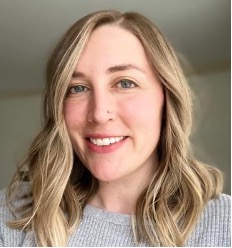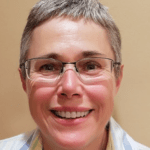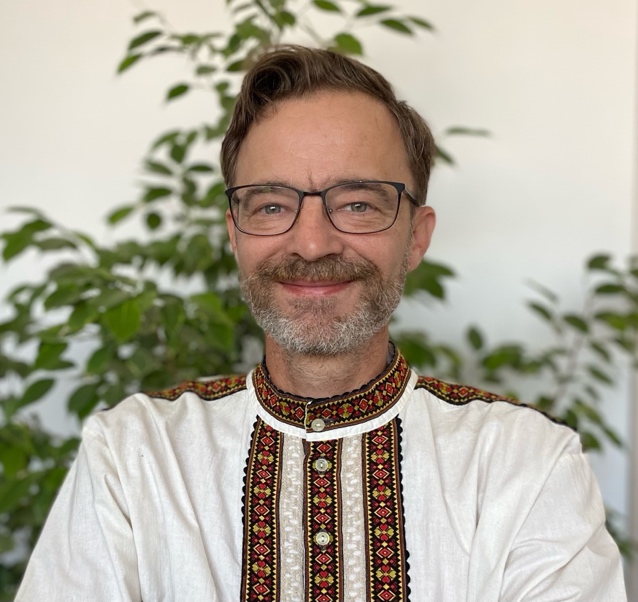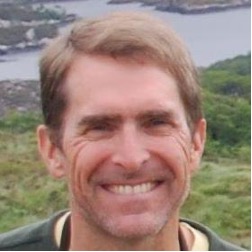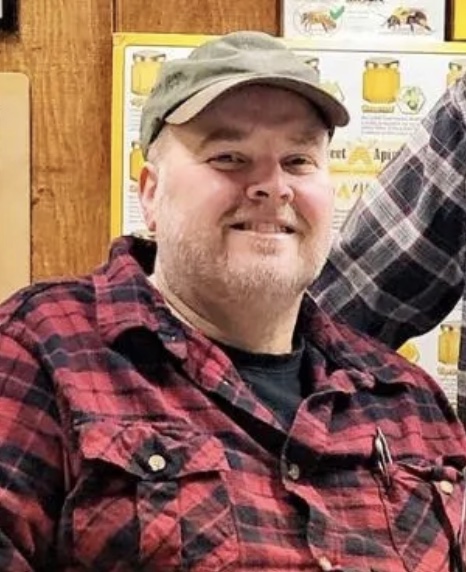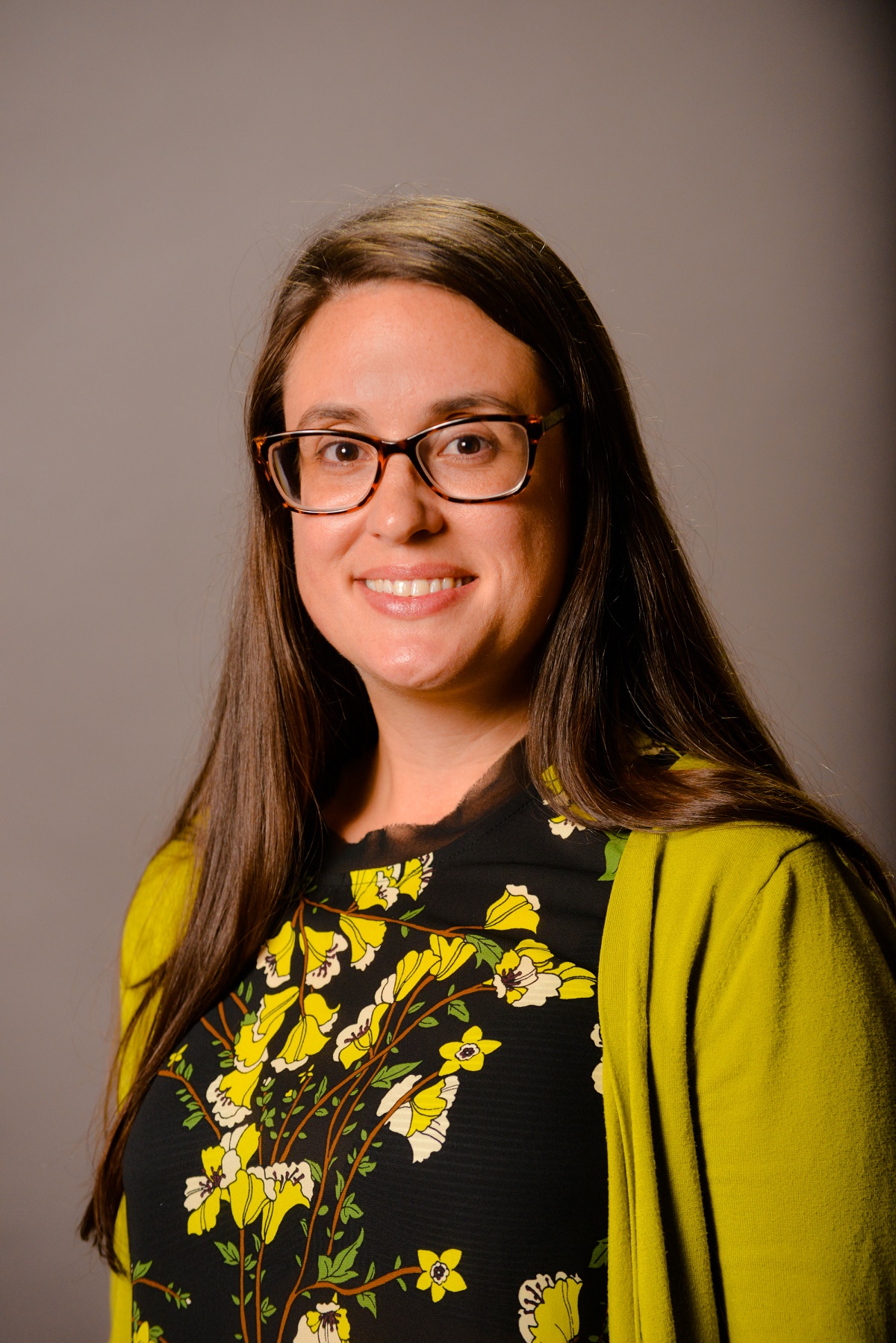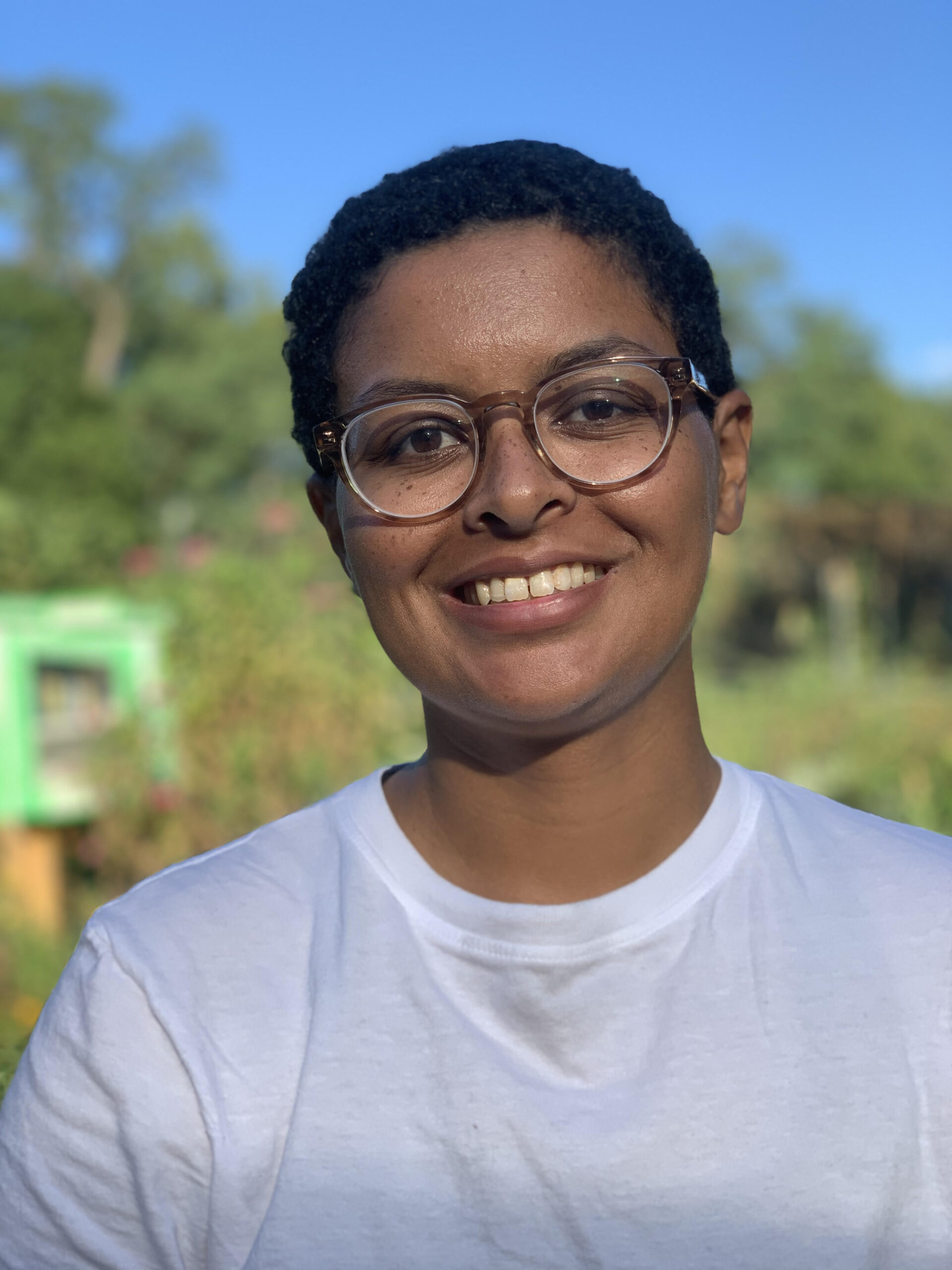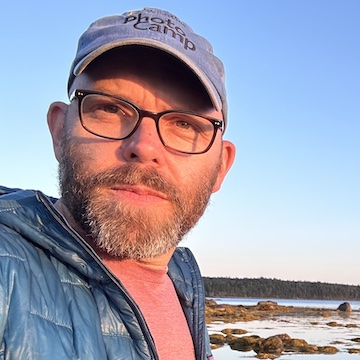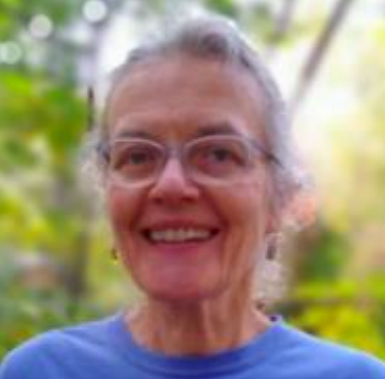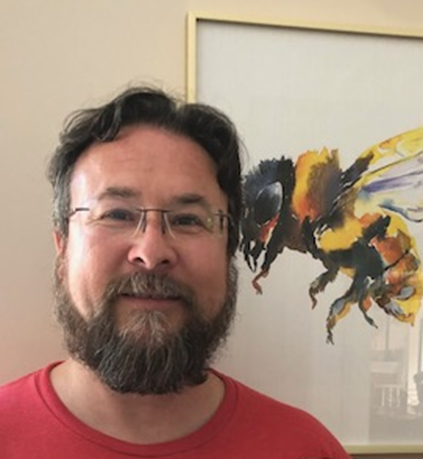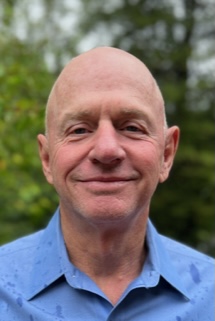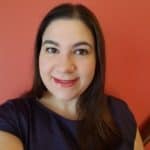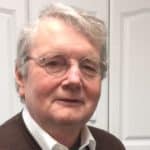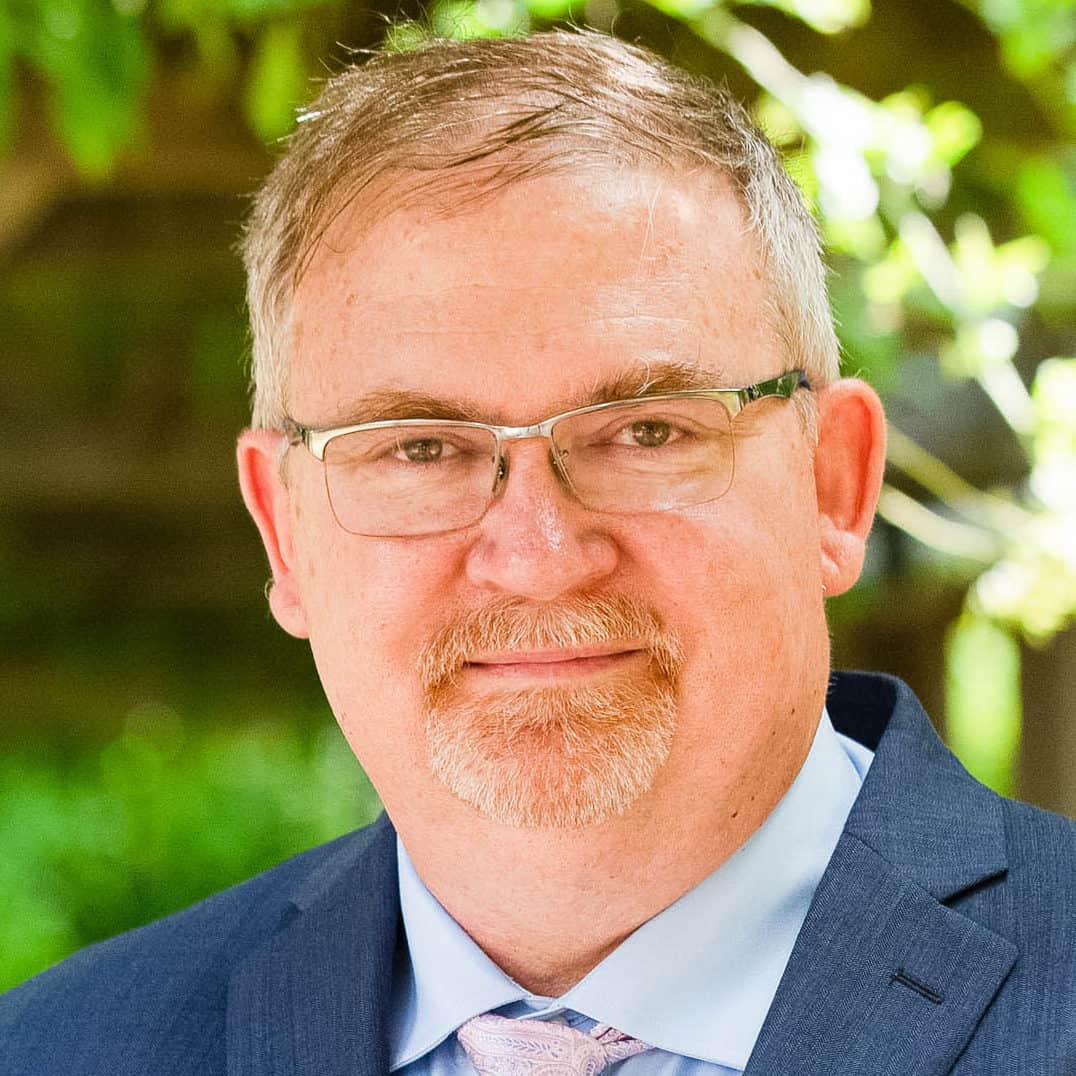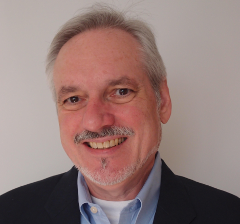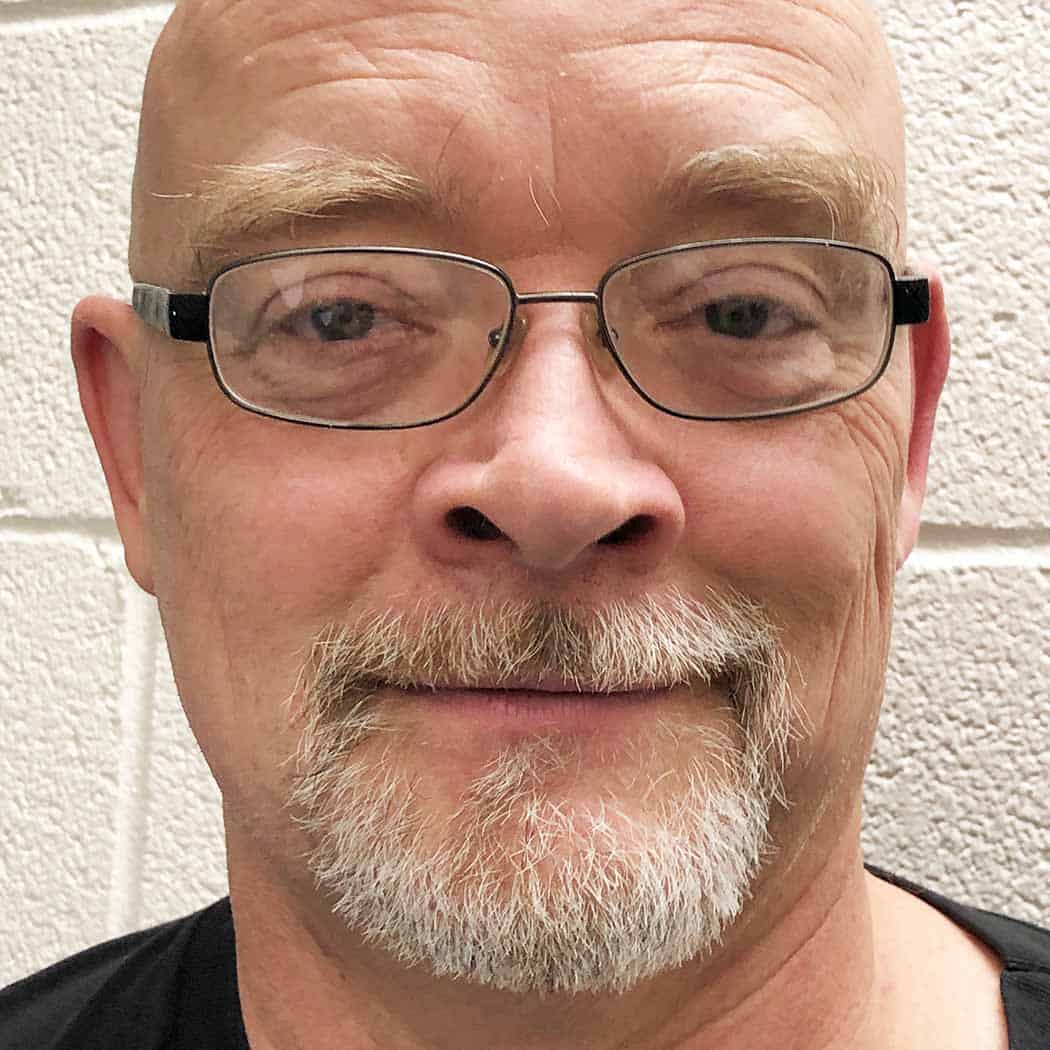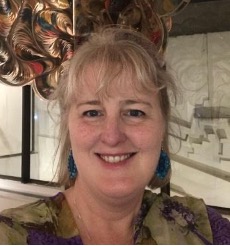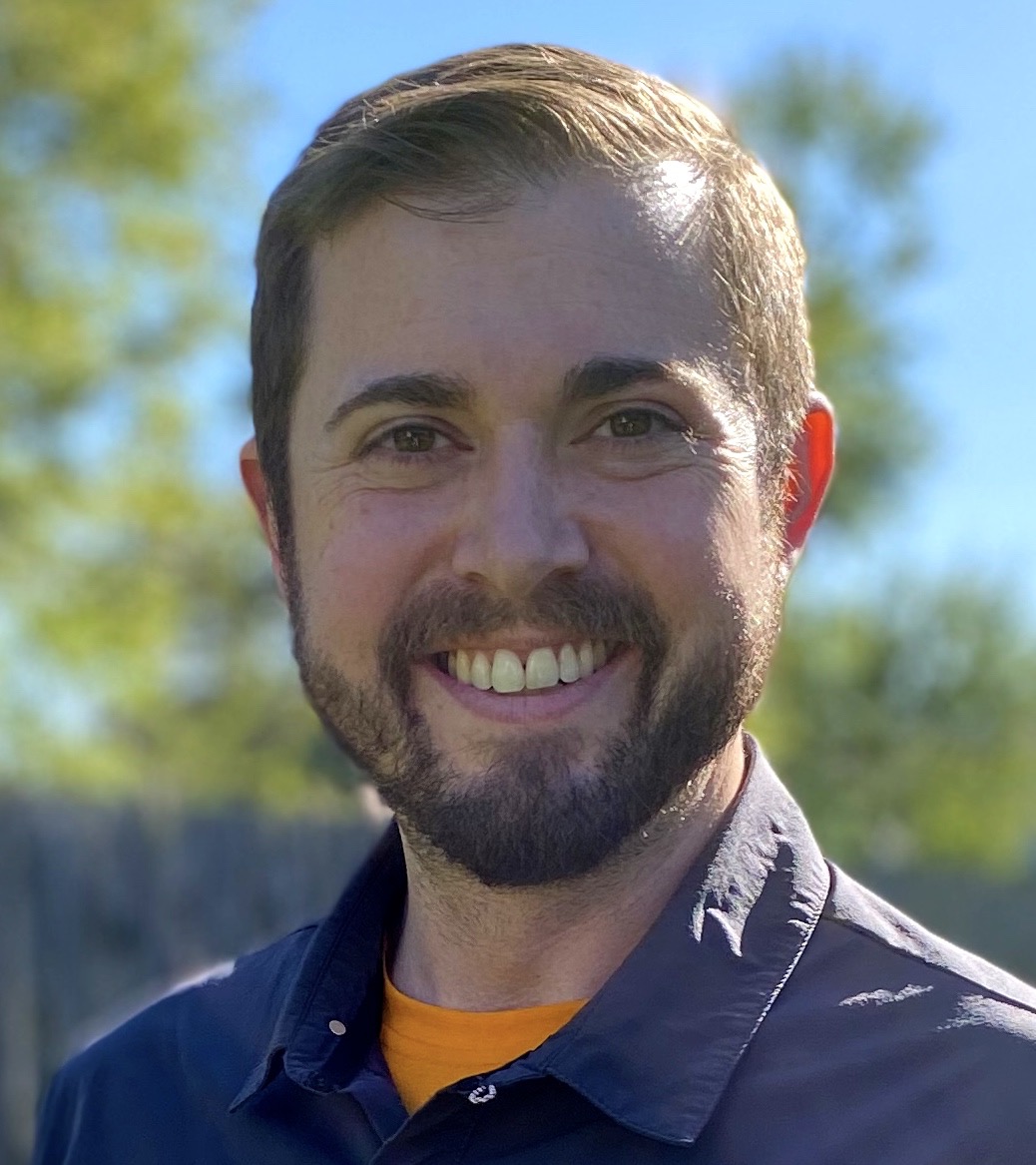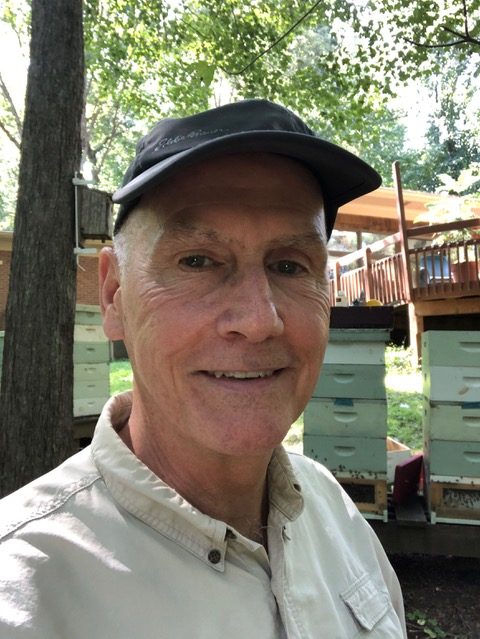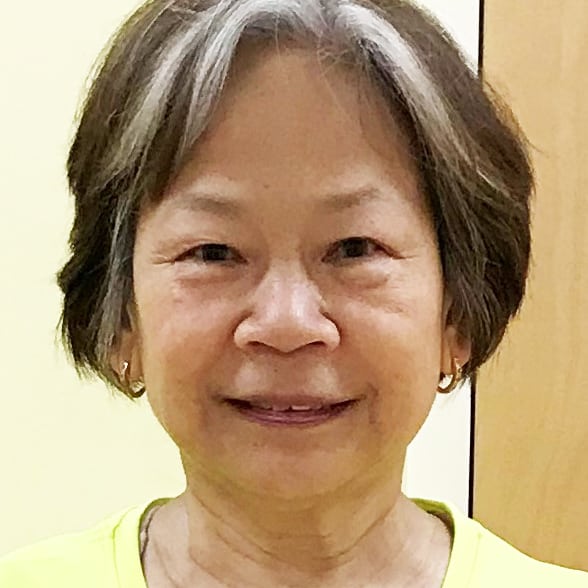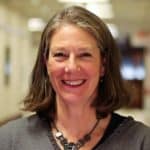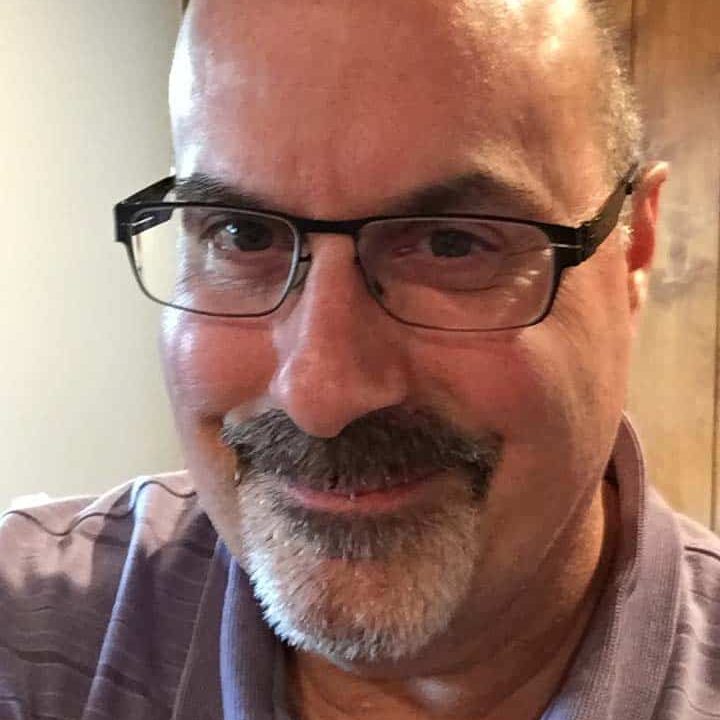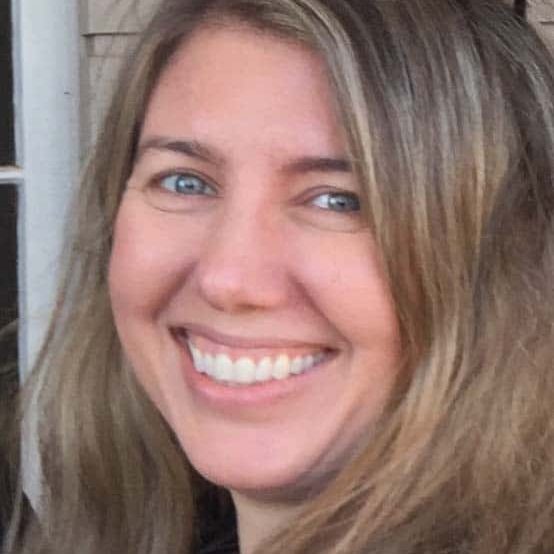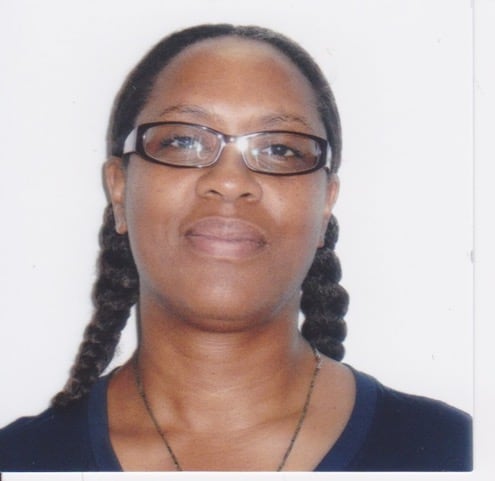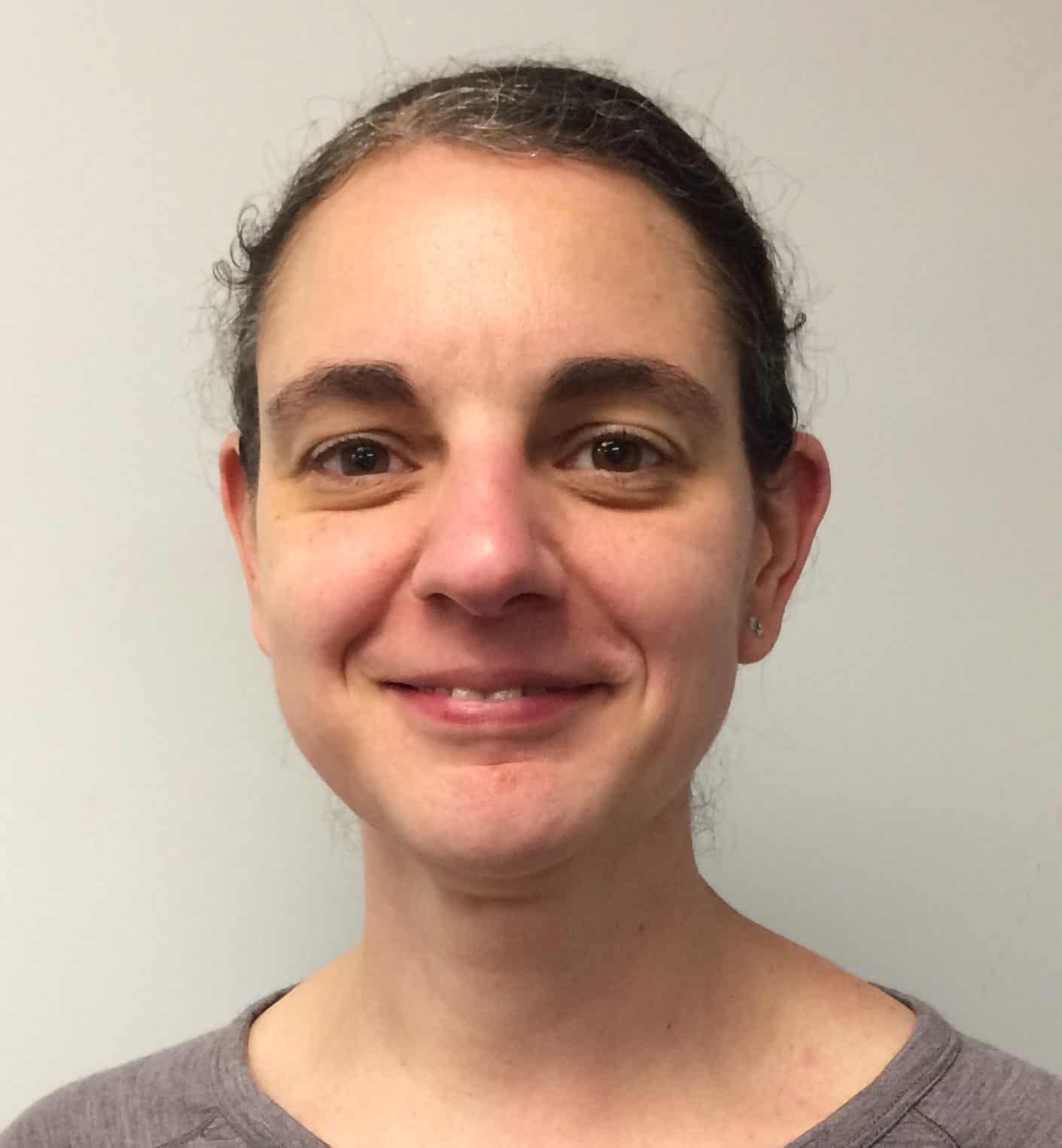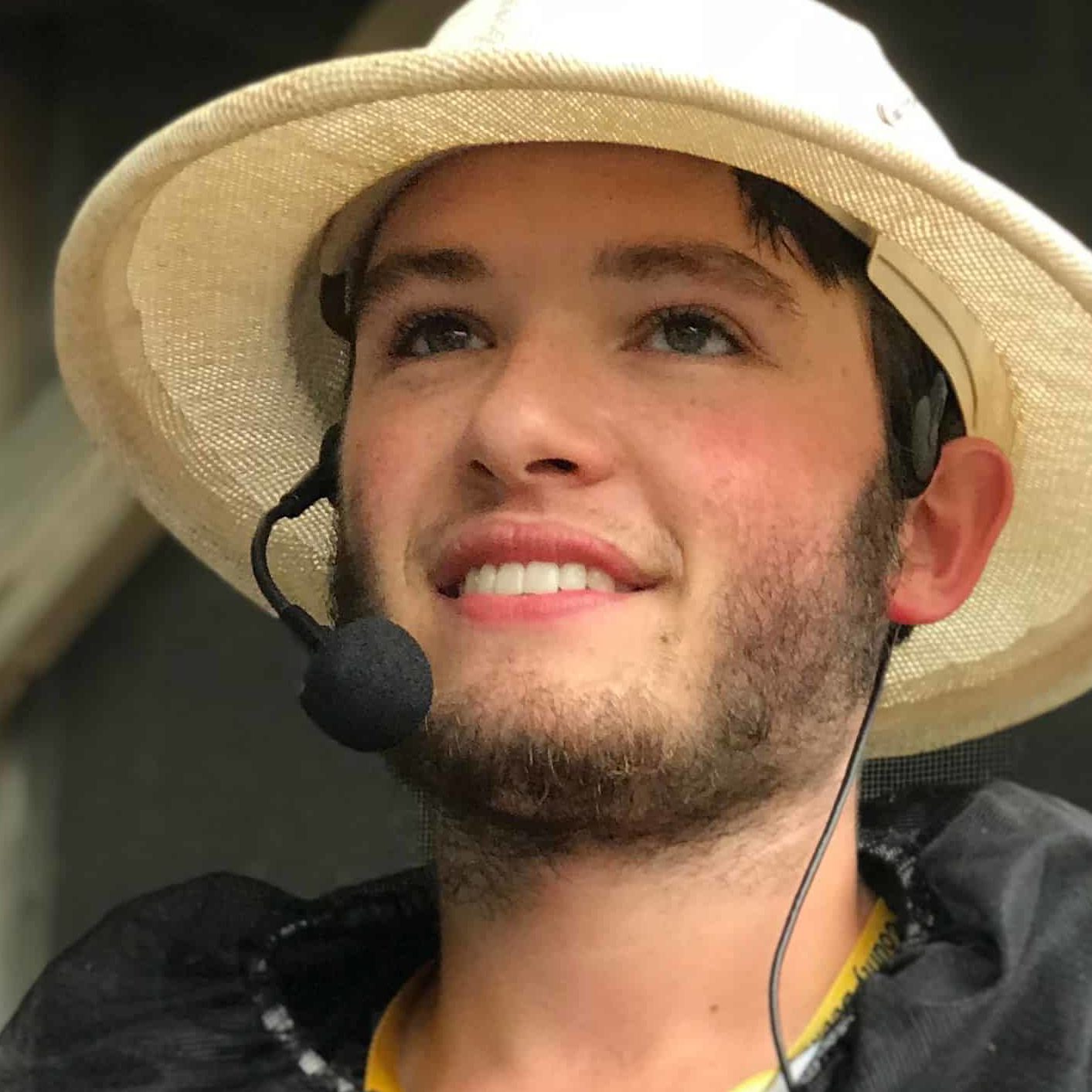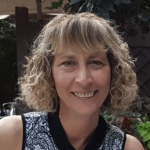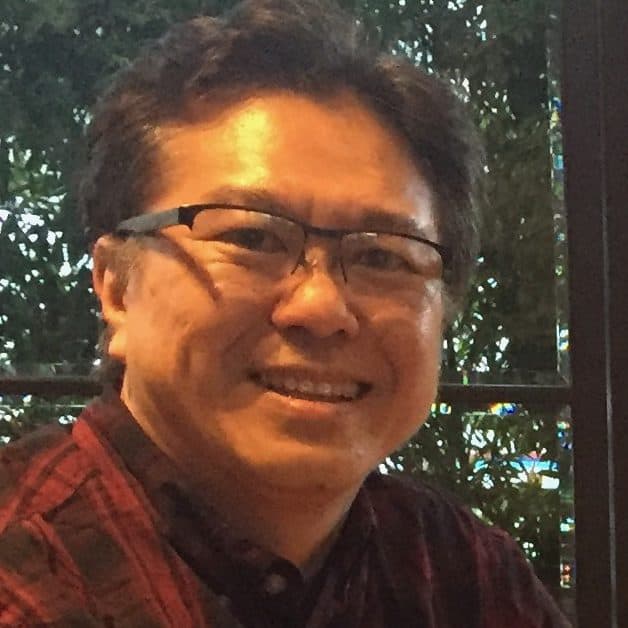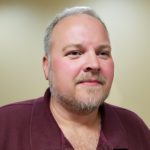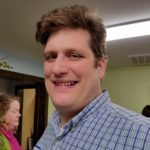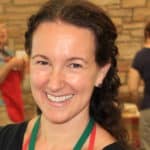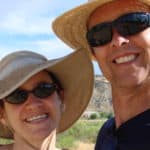2025 for MCBA Board of Directors
2025 MCBA Board of Directors Profiles
Executive Committee
Kimberly Pfirrmann-Powell, President (President since 2024, Director-at-Large 2023)
I took the short course in 2016, though officially started keeping bees in 2017 with two nucleus colonies. Since then, I've learned a lot from my fellow MCBA beekeepers as well as from the mistakes I've made along the way. I currently keep bees in the Hillandale section of Silver Spring. When I'm not actively beekeeping, I enjoy observing honeybees and all of the other insects that visit my yard. I've done a number of beekeeping demonstrations in the gazebo at the county fair over the years and really love talking to friends, neighbors, co-workers, curious strangers and new beekeepers about bees. In Fall 2020, I served as a substitute virtual mentor for the Beekeeping 101 course and then as a virtual mentor for the following classes. It's been a pleasure meeting so many club members, providing my perspective and continuing to learn. I especially enjoy providing hands-on teaching in the beeyard. Seeing new beekeepers independently identify eggs or spot a queen for the first time makes sweating buckets in my bee suit in the middle of July worth it. I enjoy giving back to the club that has taught me so much through continuing to mentor new beekeepers and by serving on the board.
Maureen Jais-Mick, Vice President (Secretary 2017 – 2019, 2023; Bee Yard Manager) I took the short course in 2013 and have been keeping from two to five hives in my backyard ever since. In 2016, I completed an 18-month internship with the Sustainable Honeybee Program in Loudoun County. I retired from working in mental health in 2016, and now volunteer at Bethesda Cares, The Smithsonian (American Indian Museum), National Park Service (Cedar Hill) and in the archives of my former employer, Saint Elizabeths Hospital. My hobby is large format photography and exploring with Ike, my yellow lab (who is also a MCBA member – check his directory listing).
John Mahaffie, Secretary (Director-at-Large 2023). I am a Bethesda-born-and-raised, DC-living newbie beekeeper. I went for beekeeper training when I decided that the only problem with my pathetic vegetable garden yields was inadequate pollination. I started two colonies in my backyard in April 2022. But I quit vegetable gardening altogether in all the excitement. My aspiration as a beekeeper is to get people to stop calling yellow jackets "bees" and the stings they get from them "bee stings."
I am a retired futurist, if it’s even possible to stop thinking about the world and where it’s headed, and what to do about it. I worked a full career helping organizations confront change and learn to think differently and with foresight. I continue to apply those skills around the region, including as a member of a DC charter school’s board of directors and as an officer of the Montgomery County Beekeepers Association. When neither those efforts, nor my bees demand my attention, I work at writing fiction. I have not yet written a story involving bees, but it won't be long.
Rick Nidel, Nominee for Treasurer (new)
I took the MCBA course in 2020 after moving to Rockville from Greenbelt during COVID. I still consider myself a novice, though my partner and I have definitely felt the zen effect of working with our hives and being more in touch with the natural world. Together, we have also done a turn at Old Macdonald’s, which we really enjoyed. I love to travel, and do so often for work and fun. Since I’ve taken up beekeeping, I am always on the lookout for bee people and bee-themed souvenirs wherever I go. Professionally, I have worked for over 20 years in non-profit management, especially in organizational development, project management and financial oversight in international humanitarian and development organization.
2025 MCBA Directors-At-Large
(alphabetical by last name)
Eric Eicher, Nominee for Director at Large (new).
My father had 4 bee hives back in Western PA when I was a boy. Although I never worked the hives with him, I would watch, get stung occasionally and spin honey. So, I definitely had a familiarity with bees if not a practical working knowledge. About 3 years ago my son, Ryan, wanted to get some bees so we bought a nuc. My wife Cindy joined in the fun and 1 hive grew to 2 which grew to 10 and we now have about 50 hives in two yards! I love spending a day in the yards but also enjoy the meetings, conferences, the fair and selling honey. Aside from beekeeping I consider myself somewhat of a business entrepreneur. Prior to retiring a few years back, I started several companies, mainly in the commercial pest management industry. Yes, there is a certain irony to that! I also enjoy spending time with my family, traveling, photography, gardening, woodworking and golf.
Jim Fraser, Director-at-Large (Past President). Jim Fraser is owner of Maryland Honey Company, a small, local, family-owned business located in Gaithersburg, Maryland. Jim is a third generation beekeeper, who learned beekeeping from his father at a young age. Jim and his son, Andrew, manage around 150 colonies of honey bees and provide pollination services for local orchards and farms. As an Eastern Apiculture Society Certified Master Beekeeper since 2014. Jim believes that education is key to successful beekeeping. Speaking to beekeeping classes, beekeeping clubs, civic groups, and customers at his shop allows him to share his knowledge about beekeeping. Jim is also a Certified Honey Show judge and a former President of the Maryland State Beekeepers Association
Meegan Kelly, Director-at-Large (Director-at-Large 2022 - 2023; Nominating Chair). I officially started beekeeping in 2020 when a swarm chose my backyard in Rockville as their new home. I don’t know where they came from, but it was the happiest of accidents and has brought much joy, confusion, education (and honey) into my life. My hope is this is just the beginning of a long journey of learning the art and science of beekeeping from people, podcasts, and books. For the last two years, I’ve co-led MCBA’s Bees After Hours meeting series for new beekeepers and served as Nominating Committee Chair for the Board. During the week, I work on energy efficiency and renewable energy at the U.S. Department of Energy.
Amina Manguera, Director-at-Large (new) I took a beekeeping class at University of Maryland while getting my degree in History. I was instantly hooked and got bees after graduating. My bees and I live in Silver Spring, where I was born and raised. While I’m still relatively new to beekeeping, I enjoy learning from the bees! Professionally, I’m a Washington D.C. Tour Guide. When I’m not with my bees or at work, you can find me volunteering as a docent with the National Park Service down on the National Mall or chaperoning a fun field trip with my local 4th grade Girl Scout Troop!
Stephen Mefford, Director-at-Large (new). I began my journey into beekeeping with MCBA’s introductory course in 2021, starting with little knowledge and many misconceptions. I quickly discovered a profound connection with this intricate craft. Beekeeping has provided me with a richer understanding of the seasons, deeper insight into the unique challenges of bees, and a cherished bond with a community of enthusiasts. When not tending my hives, you’ll find me at the club apiary mentoring first year beekeepers. I live in Sandy Spring with my wife and two sons.
Judy Treible, Director-at-Large (Director-at-Large 2021 - 2023) The first time I got close to bees was when Jim Fraser handed me a frame in Sept. 2013. I was hooked. The following year I got my first nuc, but it was a struggle. My colony was in a friend's yard 40 miles from my apartment, my journalism job was demanding. The bees didn't get the attention they deserved so they dwindled and died the third year. Demoralized, I took a long break, worked with some experienced beekeepers, studied and started over in a backyard a few blocks away. Being close to the bees to observe them made a huge difference. Now I have six colonies of varying sizes, a network of beekeeping friends and a living room full of hive ware.
Rick Wallace, Director-at-Large (new).
My wife and I first became interested in bees when she’d take her 4th grade class to a working farm. Every year she’d come home and say, “we need to get bees.” It was a conservation initiative she had. When we moved to MOCO and had some property, I took the Beekeeping 101 course and like a good student, bought 1 nuc and 1 package so I could compare colonies and have contrasting experiences. My 2 colonies both came through winter and quickly became 4 then 5. I have several Langstroth and a top bar hive. I love that my top bar hive has a window! It allows me to watch the bees without disturbing them too much. In my non-bee life, I’m a nurse. I’ll be planting a pollinator garden with native plants this fall and early spring – I’ve never had much of a green thumb so wish me luck.
2024 MCBA Board of Directors
Scroll down to see PROFILES on each Candidate
2024 MCBA Board of Directors Profiles
Executive Committee
Kimberly Pfirrmann-Powell, President (Director-at-Large 2023) I took the short course in 2016, though officially started keeping bees in 2017 with two nucleus colonies. Since then, I've learned a lot from my fellow MCBA beekeepers as well as from the mistakes I've made along the way. I currently have four calm hives in my backyard in Silver Spring. I enjoy observing them and all of the other insects that visit my yard when I'm not actively beekeeping. I've done a number of beekeeping demonstrations in the gazebo at the county fair over the years and really love talking to family, neighbors, co-workers, curious strangers and new beekeepers about bees. In Fall 2020, I served as a substitute virtual mentor for the Beekeeping 101 course and have been a virtual mentor for the following two classes. It's been a pleasure meeting so many club members, providing my perspective and continuing to learn. I especially enjoy providing hands-on teaching in the beeyard. Seeing new beekeepers independently identify eggs or spot a queen for the first time makes sweating buckets in my bee suit in the middle of July worth it.
Maureen Jais-Mick, Vice President (Secretary 2017 – 2019, 2023; Bee Yard Manager) I took the short course in 2013 and have been keeping from two to five hives in my backyard ever since. In 2016, I completed an 18-month internship with the Sustainable Honeybee Program in Loudoun County. I retired from working in mental health in 2016, and now volunteer at Bethesda Cares, The Smithsonian (American Indian Museum), National Park Service (Cedar Hill) and in the archives of my former employer, Saint Elizabeths Hospital. My hobby is large format photography and exploring with Ike, my yellow lab (who is also a MCBA member – check his directory listing).
John Mahaffie, Secretary (Director-at-Large 2023). I am a Bethesda-born-and-raised, DC-living newbie beekeeper. I went for beekeeper training when I decided that the only problem with my pathetic vegetable garden yields was inadequate pollination. I started two colonies in my backyard in April 2022. But I quit vegetable gardening altogether in all the excitement. My aspiration as a beekeeper is to get people to stop calling yellow jackets "bees" and the stings they get from them "bee stings." My day job, when I need to stop bothering the bees, is as a futurist. I work to help organizations understand emerging change. I apply some of those skills as a volunteer around the region, including on the board of a DC charter school. When neither my profession, nor my bees demand my attention, I work at writing fiction. I have not yet written a story involving bees, but it won't be long.
Stefanie Ottenstein, Treasurer (Treasurer 2018 - 2023). I took the MCBA short course in 2017 and now have two hives that peacefully share the backyard with my two dogs. You will find my bees foraging all around the neighborhood since I'm a terrible gardener. Like my bees, I enjoy spending my time outside, especially hiking, camping and exploring with my family. I was recently a contributing author and photographer for a guidebook on hiking with toddlers. I am also a life-long Montgomery County resident.
2024 MCBA Directors-At-Large
(alphabetical by last name)
Jim Fraser, Director-at-Large (Past President). Jim Fraser is owner of Maryland Honey Company, a small, local, family-owned business located in Gaithersburg, Maryland. Jim is a third generation beekeeper, who learned beekeeping from his father at a young age. Jim and his son, Andrew, manage around 150 colonies of honey bees and provide pollination services for local orchards and farms. As an Eastern Apiculture Society Certified Master Beekeeper since 2014. Jim believes that education is key to successful beekeeping. Speaking to beekeeping classes, beekeeping clubs, civic groups, and customers at his shop allows him to share his knowledge about beekeeping. Jim is also a Certified Honey Show judge and a former President of the Maryland State Beekeepers Association
Meegan Kelly, Director-at-Large (Director-at-Large 2022 - 2023; Nominating Chair). I officially started beekeeping in 2020 when a swarm chose my backyard in Rockville as their new home. I don’t know where they came from, but it was the happiest of accidents and has brought much joy, confusion, education (and honey) into my life. My hope is this is just the beginning of a long journey of learning the art and science of beekeeping from people, podcasts, and books. For the last two years, I’ve co-led MCBA’s Bees After Hours meeting series for new beekeepers and served as Nominating Committee Chair for the Board. During the week, I work on energy efficiency and renewable energy at the U.S. Department of Energy.
Amina Manguera, Director-at-Large (new) I took a beekeeping class at University of Maryland while getting my degree in History. I was instantly hooked and got bees after graduating. My bees and I live in Silver Spring, where I was born and raised. While I’m still relatively new to beekeeping, I enjoy learning from the bees! Professionally, I’m a Washington D.C. Tour Guide. When I’m not with my bees or at work, you can find me volunteering as a docent with the National Park Service down on the National Mall or chaperoning a fun field trip with my local 4th grade Girl Scout Troop!
Stephen Mefford, Director-at-Large (new). I began my journey into beekeeping with MCBA’s introductory course in 2021, starting with little knowledge and many misconceptions. I quickly discovered a profound connection with this intricate craft. Beekeeping has provided me with a richer understanding of the seasons, deeper insight into the unique challenges of bees, and a cherished bond with a community of enthusiasts. When not tending my hives, you’ll find me at the club apiary mentoring first year beekeepers. I live in Sandy Spring with my wife and two sons.
Judy Treible, Director-at-Large (Director-at-Large 2021 - 2023) The first time I got close to bees was when Jim Fraser handed me a frame in Sept. 2013. I was hooked. The following year I got my first nuc, but it was a struggle. My colony was in a friend's yard 40 miles from my apartment, my journalism job was demanding. The bees didn't get the attention they deserved so they dwindled and died the third year. Demoralized, I took a long break, worked with some experienced beekeepers, studied and started over in a backyard a few blocks away. Being close to the bees to observe them made a huge difference. Now I have six colonies of varying sizes, a network of beekeeping friends and a living room full of hive ware.
Rick Wallace, Director-at-Large (new). My wife and I first became interested in bees when she’d take her 4th grade class to a working farm. Every year she’s come home and say, “we need to get bees.” It was a conservation initiative she had. When we moved to MOCO and had some property, I took the Beekeeping 101 course and like a good student, bought 1 nuc and 1 package so I could compare colonies and have contrasting experiences. My 2 colonies both came through my first winter and quickly became 4 then 5. Through hive management and selling of a few nucs, I managed to keep myself to 5 Langstroth and 1 top bar hive. I love that my top bar hive has a window! It allows me to watch the bees without disturbing them too much. In my non-bee life, I’m a nurse. I’ll be planting a pollinator garden with native plants this fall and early spring – I’ve never had much of a green thumb so wish me luck.
Leon Vandenberg, Director-at-Large (President 2023, Director-at-Large 2020-2022, President 2017 – 2019) With elections coming upon us once again this year, I have decided to step down from the presidency. This past year was the 4 th time I have been the president of MCBA and it is time for new leadership. I have no want to be president for life and I feel we have members who can step into this presidency with new ideas and thoughts. I realize that I do, however, want to continue with the board as I want be a voice of experience on the board. I have been a member on the board for approximately 10 years in some capacity or another. I have worked with getting the fair organized, volunteered in many areas including organizing the Christmas Party and this year’s Barbecue, was an extractor Czar at one time and this year have done a number of outreach programs, the most recent was an evening educational program for Asbury Methodist in Gaithersburg with 200 members of Asbury Methodist in attendance. As far as beekeeping, I work approximately 120 hives, sell nucs in the spring and harvest a decent amount of honey which I sell at the fair and other outlets. With that said, I am asking for your vote.
2023 MCBA Board of Directors
2023 MCBA Board of Directors Profiles
Leon Vandenberg, President (Director-at-Large 2020-2022, President 2017 – 2019)
I took the MCBA short course in 2011 and since my adventure into beekeeping to say the least has been interesting. Currently I have over 100 hives and I wholesale honey to a few markets and in the spring have been selling nucs. I have been on the board pretty much continually since maybe 2013 and am a past president of this organization. When I found out that both the president and vice president would be stepping down, I felt that maybe I should run for president once more as I have a number of years in experience on board and we really need some continuity in the leadership.
Mike Hurst, Nominee for Vice President (Director-at-Large 2020-2022, Short Course Coordinator)
Mike and his wife Jennifer became interested in beekeeping one Sunday morning while listening to an NPR story about Flow Hives™. This was in April of 2015. Since then, the backyard apiary has grown to seven hives and the gals have become a part of their household. Mike grew up in Traverse City MI, joined the Navy at the age of 17, and started his 20-year career as a Cryptologic Electronics technician and finished as a Computer Administrator. Since then he has helped launch Sirius/XM and currently works as the Electronic Storage manager for the National Institutes of Health, Allergy and Infectious Diseases Institute (NIAID). Outside of beekeeping Mike also dabbles in 3D printing, laser cutting, and woodworking, as well as mentoring the “Knight Riders,” a FIRST Robotics team at Wheaton High School.
Maureen Jais-Mick, Nominee for Secretary (Secretary 2017 – 2019, Bee Yard Manager)
I took the short course in 2013 and have been keeping from two to five hives in my backyard ever since. In 2016, I completed an 18-month internship with the Sustainable Honeybee Program in Loudoun County. I retired from working in mental health in 2016, and now volunteer at Bethesda Cares, The Smithsonian (American Indian Museum), National Park Service (Cedar Hill) and in the archives of my former employer, Saint Elizabeths Hospital. My hobby is large format photography and exploring with Ike, my yellow lab (who is also a MCBA member – check his directory listing).
Stefanie Ottenstein, Nominee for Treasurer (Treasurer 2018 - ):
I took the MCBA short course in 2017 and now have two hives that peacefully share the backyard with my two dogs. You will find my bees foraging all around the neighborhood since I'm a terrible gardener. Like my bees, I enjoy spending my time outside, especially hiking, camping and exploring with my family. I was recently a contributing author and photographer for a guidebook on hiking with toddlers. I am also a life-long Montgomery County resident.
Edward Celarier, Nominee for Director-at-Large (new)
Edward Celarier has been a backyard beekeeper since 2017. He keeps three to six colonies in any year. He decided to jump into beekeeping the previous year, when he had noticed that he had not seen one honey bee in his neighborhood the entire summer. But before taking delivery of a couple of boxes full of stinging insects, he took the MCBA short course. Edward is a professional scientist by day (and sometimes by night). Having focused mostly on chemistry and physics, beekeeping is his step into the very different world of biology. Besides MCBA, he is on the Board of Adventure in Science, Inc., a 4-H and Maryland Extension affiliate, that offers Saturday morning hands-on science activities to students aged 8 to 15.
Meegan Kelly, Nominee for Director at Large (Director-at-Large 2021 - )
I officially started beekeeping in 2020 when a swarm chose my backyard in Rockville as their new home. I don’t know where they came from, but it was the happiest of accidents and has brought much joy, confusion, education (and honey) into my life. My hope is this is just the beginning of a long journey of learning the art and science of beekeeping from people, podcasts, and books. Most weekends, I’m doing something outdoors and on Saturdays, you can usually find me impersonating a mentor at the club apiary at Brookside. During the week, I work on energy efficiency and renewable energy at the U.S. Department of Energy. In a past life, I served on the Board of Directors and as Chair of Fundraising Committee for The Media Arts Project in Asheville, NC.
John Mahaffie, Nominee for Director-at-Large (new)
I am a Bethesda-born-and-raised, DC-living newbie beekeeper. I went for beekeeper training when I decided that the only problem with my pathetic vegetable garden yields was inadequate pollination. I started two colonies in my backyard in April 2022. But I quit vegetable gardening altogether in all the excitement. My aspiration as a beekeeper is to get people to stop calling yellow jackets "bees" and the stings they get from them "bee stings." My day job, when I need to stop bothering the bees, is as a futurist. I work to help organizations understand emerging change. I apply some of those skills as a volunteer around the region, including on the board of a DC charter school. When neither my profession, nor my bees demand my attention, I work at writing fiction. I have not yet written a story involving bees, but it won't be long.
Kimberly Pfirrmann-Powell, Nominee for Director-at-Large (new) |
I took the short course in 2016, though officially started keeping bees in 2017 with two nucleus colonies. Since then, I've learned a lot from my fellow MCBA beekeepers as well as from the mistakes I've made along the way. I currently have four calm hives in my backyard in Silver Spring. I enjoy observing them and all of the other insects that visit my yard when I'm not actively beekeeping. I've done a number of beekeeping demonstrations in the gazebo at the county fair over the years and really love talking to family, neighbors, co-workers, curious strangers and new beekeepers about bees. In Fall 2020, I served as a substitute virtual mentor for the Beekeeping 101 course and have been a virtual mentor for the following two classes. It's been a pleasure meeting so many club members, providing my perspective and continuing to learn. I especially enjoy providing hands-on teaching in the beeyard. Seeing new beekeepers independently identify eggs or spot a queen for the first time makes sweating buckets in my bee suit in the middle of July worth it.
Judy Treible, Nominee for Director-at-Large (Director-at-Large 2021 - )
The first time I got close to bees was when Jim Fraser handed me a frame in Sept. 2013. I was hooked. The following year I got my first nuc, but it was a struggle. My colony was in a friend's yard 40 miles from my apartment, my journalism job was demanding. The bees didn't get the attention they deserved so they dwindled and died the third year. Demoralized, I took a long break, worked with some experienced beekeepers, studied and started over in a backyard a few blocks away. Being close to the bees to observe them made a huge difference. Now I have six colonies of varying sizes, a network of beekeeping friends and a living room full of hive ware.
Donald Van Ryk, Nominee for Director-at-Large (Director-at-Large 2020 - )
Much to the dismay of my neighbors, I became a backyard beekeeper in Rockville four years ago. They have since come to understand that bees are harmless if you leave them to their bee business and so it’s been educational for everyone, although bribing them with honey may have had something to do with it. Their acceptance of the situation has no doubt been enhanced by the amusement they derive by watching the bees crawl up my pant leg and sting me. I’m still working on keeping the bees happy with somewhat limited success, since every spring at least half of them pack up and leave in spite of the lovely home I have provided them. Ingrates. When I’m not slaving away in front of a hot smoker, I play the role of a research biochemist at NIH in Bethesda, pushing back those frontiers of science.
Carlie Williams, Nominee for Director-at-Large (new)
I have been a beekeeper for 4 seasons and like so many enjoy the delights and challenges of having bees in my life. When I am not in the hives I am working in my hobby garden tending my ponds, growing vegetables and working to transform my garden to native flowers. In Maryland our yard is 65' x 130' near NIH - so the bees and the garden are in the front yard, because that's where the sun is. You can imagine this means I spend a good deal of time talking about bees and raspberries with the neighbors. We also spend time in Connecticut where we have a large forest for which we are responsible. Managing a native forest is teaching us a great deal and I can't wait to add bees to my farm up there. During the work week I am an infectious disease epidemiologist at NIH working on HIV in the US and internationally. I have been at the Division of AIDS for over 20 years and from my job there I get to interact with researchers around the world and travel frequently. Always fun to meet a beekeeper abroad. My husband has recently retired from NIH and is devoting himself to boat building and the forest in Connecticut - not bees. I'm afraid he represents the general consensus of the house - which is that it is okay if it is my hobby, but don't let them in the house. We also have three dogs - who love to chase bees even if they are "spicy" and you get stung. My goals as a beekeeper are to be ever more sustainable in maintaining nukes and hives that are disease and pest free, make some honey, and use the wax for candles and crafts like soap making. I love having 2 or 3 hives with a nuc or two, 5 hives is too many. Still learning, still enjoying the journey.
2022 MCBA Board of Directors
2022 MCBA Board of Directors Profiles
Eric Malcolm, President (2022) I started my adventures in beekeeping with the Beginner Beekeeping Course in early 2017 while I was a stay at home dad. I ordered my first packages while completing the course and got right to work immersing myself in beekeeping. I am the owner of Backyard Apiaries, an apiary management service providing hive consultation and management services to private clients and work at the vanEngelsdorp Bee Lab at UMD and Bee Informed Partnership coordinating Fundraising, Operations, and Communications. A little over a year ago I developed an allergy to honey bee venom, so if you see me in the bee yard, I have a full suit and leather gloves on, but the thought of giving up beekeeping never crossed my mind. I love people, meeting beekeepers, and talking/learning about bees. My non-beekeeping hobbies include anything in nature, foraging, playing music, and going on adventures with my wife, Kelly, and daughter, Eden.
Len Greig, Vice President (2022) Len has kept bees at his home in Springbrook Forest since 2000. His introduction to beekeeping began with attending MCBKA meetings in the fall of 1999 and then the club’s 2000 short course. That April he dived into beekeeping with two packages and has kept bees every year since. He attended the 2000 EAS conference hosted by the Maryland State Beekeeper’s Association that year. In the past he managed the club’s apiary hives and the observation hive at the Brookside Nature Center. After retiring from the US Coast Guard in 2004, Len began teaching Navy JROTC at Seneca Valley High School and then at Kennedy High School in 2007. Len retired from MCPS in 2016 and entered college full time earning an associate of applied science in the field of aviation. In his aviation studies Len earned his FAA certification as a helicopter flight instructor in November 2019 and as a helicopter instrument flight instructor in July 2020. He is also a FAA certified commercial UAV pilot. Len has lifetime memberships in the MCBKA, the Maryland Beekeeper’s Association, and the Eastern Apicultural Society. Len served as a virtual mentor for the 2020 and 2021 MCBKA Beekeeping 101 courses as well as visiting the bee yards of several mentees. Len has also served as a mentor several times at the club’s apiary at Brookside Nature Center. Len enjoys time with the bees, finding It both relaxing and rewarding. The bees keep him in touch with nature and the seasons. Len also has 11 solitary bee hives hanging on his house. Currently, his main beekeeping goal is to, as much as possible, become a self-sustaining beekeeper through maintaining a healthy mix of hives and nucs. Maximum number of hives: 7
Stefanie Ottenstein, Treasurer (2018): I took the MCBA short course in 2017 and now have two hives that peacefully share the backyard with my two dogs. You will find my bees foraging all around the neighborhood since I'm a terrible gardener. Like my bees, I enjoy spending my time outside, especially hiking, camping and exploring with my family. I was recently a contributing author and photographer for a guidebook on hiking with toddlers. I am also a life-long Montgomery County resident.
Trina Sensinig, Secretary (2020): I started my backyard beekeeping with the 2018 course and two nucleus hives. Successes so far: two walk-away splits, hive furniture that are square enough, and first-harvest honey that won state awards in 2019. My goals are to transition to 5-frame (nuc) hives (they are more my size—petite); progress to sustainable Integrated Pest Management; have a carefree pollinator garden that makes everybody happy, including neighbors who dote on their lawns; make fondant that stays soft; learn to rear queens; and eventually share what I have synthesized from my own experience and others’. After graduate school, I worked in international development and lived in the Philippines, Thailand, Zaire (DR Congo), Tanzania, and Utah. I retired from Bishop O’Connell HS in Arlington, and enjoy exercising--the mind (learning about everything), the body (zumba, yoga, walking, maybe weight lifting), the spirit (church & volunteer activities), and the emotions (being with family and friends, and people who care about the environment and bees).
Frank Linton, Director at Large (2018): Frank Linton, Ed.D, a retired artificial intelligence engineer, has kept honey bees since 2005. An EAS-Certified Master Beekeeper, his main interest is in finding ways to use remote sensing technologies to monitor and improve honey bee colony health and productivity. Author of The Observation Hive Handbook, maintainer of the websites thebeepeeker.com and colonymonitoring.com, contributor to beekeeping magazines, speaker at beekeeping associations and civic groups, and mentor to new beekeepers, Frank runs a few hives near his urban apartment and hosts an observation hive in his office. He also manages the Club’s observation hive at Brookside Nature Center and has prepared materials that help visitors understand what they are seeing inside the hive.
Leon Vandenberg, Director-at-Large (2021) I took the short course from MCBA in 2012. At the time I wanted bees for the pollination of the veggies in my garden. First year, as everyone else, I started with 2 hives from packages that I bought from Jim Fraser. Fast forward, I served as a MCBA board member for a couple of years starting in either 2014 or 15. I then served as the President of MCBA for 3 years ending November 2019 when our current president took over. My 2 hives have now grown to just short of 100 hives with hives in both Montgomery and Howard counties. I have tried to not miss a mentoring session at the Brookside Nature Center Apiary and helped with much of the construction of the apiary in the earlier days our MCBA apiary at Brookside. I continue to coordinate our relationship between MCBA and Brookside nature center. Since Frank Linton no longer can take care of the observation hive at Brookside this is something that has become my responsibility. Though we did not have any events at the Montgomery County Fair this year due to COVID, in the past I have not only volunteered for many of the events, I also have spent a couple of days each week of the fair as manager of the day for MCBA. I retired from my full-time job a few years ago and even though I stay quite busy with my own hives, I want to also stay involved with MCBA as it has been one of the most rewarding organizations I have associated with.
Peter Soukup, Director at Large (2017): Peter has been keeping bees in Gaithersburg for the past 5 years and has dabbled in queen incubation and breeding. Besides being a beekeeper, Peter is a R&D electrical engineer focused on wireless design. He is an avid alternative fuel innovator from solar to electric vehicles to converting diesel engines to run on used vegetable oil.
Judy Treible, Director-at-Large (2021) The first time I got close to bees was when Jim Fraser handed me a frame in Sept. 2013. I was hooked. The following year I got my first nuc, but it was a struggle. My colony was in a friend's yard 40 miles from my apartment, my journalism job was demanding. The bees didn't get the attention they deserved so they dwindled and died the third year. Demoralized, I took a long break, worked with some experienced beekeepers, studied and started over in a backyard a few blocks away. Being close to the bees to observe them made a huge difference. Now I have six colonies of varying sizes, a network of beekeeping friends and a living room full of hive ware.
Mike Hurst, Director at Large (2020): Mike and his wife Jennifer became interested in beekeeping one Sunday morning while listening to an NPR story about Flow Hives™. This was in April of 2015. Since then, the backyard apiary has grown to seven hives and the gals have become a part of their household. Mike grew up in Traverse City MI, joined the Navy at the age of 17, and started his 20-year career as a Cryptologic Electronics technician and finished as a Computer Administrator. Since then he has helped launch Sirius/XM and currently works as the Electronic Storage manager for the National Institutes of Health, Allergy and Infectious Diseases Institute (NIAID). Outside of beekeeping Mike also dabbles in 3D printing, laser cutting, and woodworking, as well as mentoring the “Knight Riders,” a FIRST Robotics team at Wheaton High School.
Donald Van Ryk, Director at Large (2020): Much to the dismay of my neighbors, I became a backyard beekeeper in Rockville four years ago. They have since come to understand that bees are harmless if you leave them to their bee business and so it’s been educational for everyone, although bribing them with honey may have had something to do with it. Their acceptance of the situation has no doubt been enhanced by the amusement they derive by watching the bees crawl up my pant leg and sting me. I’m still working on keeping the bees happy with somewhat limited success, since every spring at least half of them pack up and leave in spite of the lovely home I have provided them. Ingrates. When I’m not slaving away in front of a hot smoker, I play the role of a research biochemist at NIH in Bethesda, pushing back those frontiers of science.
Meegan Kelly, Director at Large (2022): I officially started beekeeping in 2020 when a swarm chose my backyard in Rockville as their new home. I don’t know where they came from, but it was the happiest of accidents and has brought much joy, confusion, education (and honey) into my life. My hope is this is just the beginning of a long journey of learning the art and science of beekeeping from people, podcasts, and books. Most weekends, I’m doing something outdoors and on Saturdays, you can usually find me impersonating a mentor at the club apiary at Brookside. During the week, I work on energy efficiency and renewable energy at the U.S. Department of Energy. In a past life, I served on the Board of Directors and as Chair of Fundraising Committee for The Media Arts Project in Asheville, NC.
MCBA Positions and Representatives (appointed)
Phil Frank, Webmaster
Jim Fraser, County Fair Liaison
Maureen Jais-Mick, Bee Yard Manager
Rob Jenson, Community/Educational Outreach
Janice Johnson, Observation Hive Docent (Brookside Nature Center)
Frank McCowan, Extractor/Equipment Manager
Elaine Rodrigues, Refreshments Coordinator
Marie Rojas, Extractor/Equipment Manager and Up-County Member Liaison
Leon Vandenberg, Brookside Nature Center Liaison
Mike Hurst, Short Course Coordinator
2021 MCBA Board of Directors
2021 MCBA Board of Directors Profiles
Pam Hepp, President (2020): I became a beekeeper in 2013 - took the short course and got my package of bees. I first got interested in bees while in Greece, years ago. I was curious about the numbered boxes that lined the roadways. Failing tomatoes and teaching high school biology catalyzed me to jump in and actually get bees. My "bee cred" grows each year - I've split hives, caught swarms, lost a hive, made boxes, and dealt with wax moths. I extract delicious honey and make terrible mead. I am a big fan of honey shows and fairs. I’ve coordinated the educational outreach for the club, as well as serving as Vice President. I thoroughly enjoy reaching out to beekeepers and inviting them speak at MCBA meetings. I'd like to keep the club responsive to the members, providing great bee information and experiences. When I am not beekeeping, I am in the vegetable garden or cycling with my husband, exploring new trails and sites. My days are spent on the campus of NIH, administratively supporting the clinical trials of the National Eye Institute. I have three grown sons. Eventually, I'd like to be a farmer, growing heirloom tomatoes, collecting fresh eggs, herding goats and, of course, keeping bees.
Eric Malcolm, Vice President (2021) I started my adventures in beekeeping with the Beginner Beekeeping Course in early 2017 while I was a stay at home dad. I ordered my first packages while completing the course and got right to work immersing myself in beekeeping. I am the owner of Backyard Apiaries, an apiary management service providing hive consultation and management services to private clients and work at the vanEngelsdorp Bee Lab at UMD and Bee Informed Partnership coordinating Fundraising, Operations, and Communications. A little over a year ago I developed an allergy to honey bee venom, so if you see me in the bee yard, I have a full suit and leather gloves on, but the thought of giving up beekeeping never crossed my mind. I love people, meeting beekeepers, and talking/learning about bees. My non-beekeeping hobbies include anything in nature, foraging, playing music, and going on adventures with my wife, Kelly, and daughter, Eden.
Stefanie Ottenstein, Treasurer (2018): I took the MCBA short course in 2017 and now have two hives that peacefully share the backyard with my two dogs. You will find my bees foraging all around the neighborhood since I'm a terrible gardener. Like my bees, I enjoy spending my time outside, especially hiking, camping and exploring with my family. I was recently a contributing author and photographer for a guidebook on hiking with toddlers. I am also a life-long Montgomery County resident.
Trina Sensinig, Secretary (2020): I started my backyard beekeeping with the 2018 course and two nucleus hives. Successes so far: two walk-away splits, hive furniture that are square enough, and first-harvest honey that won state awards in 2019. My goals are to transition to 5-frame (nuc) hives (they are more my size—petite); progress to sustainable Integrated Pest Management; have a carefree pollinator garden that makes everybody happy, including neighbors who dote on their lawns; make fondant that stays soft; learn to rear queens; and eventually share what I have synthesized from my own experience and others’. After graduate school, I worked in international development and lived in the Philippines, Thailand, Zaire (DR Congo), Tanzania, and Utah. I retired from Bishop O’Connell HS in Arlington, and enjoy exercising--the mind (learning about everything), the body (zumba, yoga, walking, maybe weight lifting), the spirit (church & volunteer activities), and the emotions (being with family and friends, and people who care about the environment and bees).
Frank Linton, Director at Large (2018): Frank Linton, Ed.D, a retired artificial intelligence engineer, has kept honey bees since 2005. An EAS-Certified Master Beekeeper, his main interest is in finding ways to use remote sensing technologies to monitor and improve honey bee colony health and productivity. Author of The Observation Hive Handbook, maintainer of the websites thebeepeeker.com and colonymonitoring.com, contributor to beekeeping magazines, speaker at beekeeping associations and civic groups, and mentor to new beekeepers, Frank runs a few hives near his urban apartment and hosts an observation hive in his office. He also manages the Club’s observation hive at Brookside Nature Center and has prepared materials that help visitors understand what they are seeing inside the hive.
Leon Vandenberg, Director-at-Large (2021) I took the short course from MCBA in 2012. At the time I wanted bees for the pollination of the veggies in my garden. First year, as everyone else, I started with 2 hives from packages that I bought from Jim Fraser. Fast forward, I served as a MCBA board member for a couple of years starting in either 2014 or 15. I then served as the President of MCBA for 3 years ending November 2019 when our current president took over. My 2 hives have now grown to just short of 100 hives with hives in both Montgomery and Howard counties. I have tried to not miss a mentoring session at the Brookside Nature Center Apiary and helped with much of the construction of the apiary in the earlier days our MCBA apiary at Brookside. I continue to coordinate our relationship between MCBA and Brookside nature center. Since Frank Linton no longer can take care of the observation hive at Brookside this is something that has become my responsibility. Though we did not have any events at the Montgomery County Fair this year due to COVID, in the past I have not only volunteered for many of the events, I also have spent a couple of days each week of the fair as manager of the day for MCBA. I retired from my full-time job a few years ago and even though I stay quite busy with my own hives, I want to also stay involved with MCBA as it has been one of the most rewarding organizations I have associated with.
Peter Soukup, Director at Large (2017): Peter has been keeping bees in Gaithersburg for the past 5 years and has dabbled in queen incubation and breeding. Besides being a beekeeper, Peter is a R&D electrical engineer focused on wireless design. He is an avid alternative fuel innovator from solar to electric vehicles to converting diesel engines to run on used vegetable oil.
Judy Treible, Director-at-Large (2021) The first time I got close to bees was when Jim Fraser handed me a frame in Sept. 2013. I was hooked. The following year I got my first nuc, but it was a struggle. My colony was in a friend's yard 40 miles from my apartment, my journalism job was demanding. The bees didn't get the attention they deserved so they dwindled and died the third year. Demoralized, I took a long break, worked with some experienced beekeepers, studied and started over in a backyard a few blocks away. Being close to the bees to observe them made a huge difference. Now I have six colonies of varying sizes, a network of beekeeping friends and a living room full of hive ware.
Christopher Heathcote, Director at Large (2020): Chris is an occupational therapist working for the Department of Veterans Affairs in Washington D.C., who is a first-year beekeeper. He contemplated raising chickens, but his wife said-NO! So, a few years later he made an executive decision and informed her that he WAS going to keep bees. In his first year as a beekeeper, he has created a nucleus hive, caught a swarm, re-queened a hive, realized that the bees really make the decisions, learned about mite control and treatments, and combined a hive with the newspaper method: a lot for a first-year beekeeper. His wife has since nicked-named him “Buzz” and calls herself the “Bee Widow.” She also claims he has read every bee book ever published, and watched every bee video ever made: a claim he wholly denies! Chris has also served as a mentor in the Club’s apiary this year.
Mike Hurst, Director at Large (2020): Mike and his wife Jennifer became interested in beekeeping one Sunday morning while listening to an NPR story about Flow Hives™. This was in April of 2015. Since then, the backyard apiary has grown to seven hives and the gals have become a part of their household. Mike grew up in Traverse City MI, joined the Navy at the age of 17, and started his 20-year career as a Cryptologic Electronics technician and finished as a Computer Administrator. Since then he has helped launch Sirius/XM and currently works as the Electronic Storage manager for the National Institutes of Health, Allergy and Infectious Diseases Institute (NIAID). Outside of beekeeping Mike also dabbles in 3D printing, laser cutting, and woodworking, as well as mentoring the “Knight Riders,” a FIRST Robotics team at Wheaton High School.
Donald Van Ryk, Director at Large (2020): Much to the dismay of my neighbors, I became a backyard beekeeper in Rockville four years ago. They have since come to understand that bees are harmless if you leave them to their bee business and so it’s been educational for everyone, although bribing them with honey may have had something to do with it. Their acceptance of the situation has no doubt been enhanced by the amusement they derive by watching the bees crawl up my pant leg and sting me. I’m still working on keeping the bees happy with somewhat limited success, since every spring at least half of them pack up and leave in spite of the lovely home I have provided them. Ingrates. When I’m not slaving away in front of a hot smoker, I play the role of a research biochemist at NIH in Bethesda, pushing back those frontiers of science.
MCBA Positions and Representatives (appointed)
Phil Frank, Webmaster
Jim Fraser, County Fair Liaison
Maureen Jais-Mick, Bee Yard Manager
Rob Jenson, Community/Educational Outreach
Janice Johnson, Observation Hive Docent (Brookside Nature Center)
Frank McCowan, Extractor/Equipment Manager
Elaine Rodrigues, Refreshments Coordinator
Marie Rojas, Extractor/Equipment Manager and Up-County Member Liaison
Leon Vandenberg, Brookside Nature Center Liaison
Mike Hurst, Short Course Coordinator
2020 MCBA Board of Directors
2020 MCBA Board of Directors Profiles
Pam Hepp, President (2020): I became a beekeeper in 2013 - took the short course and got my package of bees. I first got interested in bees while in Greece, years ago. I was curious about the numbered boxes that lined the roadways. Failing tomatoes and teaching high school biology catalyzed me to jump in and actually get bees. My "bee cred" grows each year - I've split hives, caught swarms, lost a hive, made boxes, and dealt with wax moths. I extract delicious honey and make terrible mead. I am a big fan of honey shows and fairs. I’ve coordinated the educational outreach for the club, as well as serving as Vice President. I thoroughly enjoy reaching out to beekeepers and inviting them speak at MCBA meetings. I'd like to keep the club responsive to the members, providing great bee information and experiences. When I am not beekeeping, I am in the vegetable garden or cycling with my husband, exploring new trails and sites. My days are spent on the campus of NIH, administratively supporting the clinical trials of the National Eye Institute. I have three grown sons. Eventually, I'd like to be a farmer, growing heirloom tomatoes, collecting fresh eggs, herding goats and, of course, keeping bees.
Anne Kozak, Vice President (2020): From the first time I suited-up and placed a package in a hive at the MCBA club beeyard in 2018, I knew I wanted to keep bees! I had just finished the MCBA short course and wanted to practice the first year before getting my own hives in 2019. Thanks to the great guidance provided by everyone in the Club, I felt prepared my second year to catch a swarm, split a hive, mark all of my queens, and teach a class of kindergarteners about bees. As MCBA Vice-President, I look forward to hearing more about the needs of members and bringing my leadership experience and beekeeping enthusiasm to club meetings and activities. For the past 4 years, I have served on the Board of Directors for the 4000+ member Patent and Trademark Office Society, through which I regularly organize events and participate in outreach activities. I am also a volunteer with the Collegiate Inventors Competition, the National Inventors Hall of Fame, and the Baldrige Communities of Excellence 2026. When I’m not obsessing over my two backyard hives, you can find me reviewing patent applications and spending time with my husband and our hens and cat in Silver Spring.
Stefanie Ottenstein, Treasurer (2018): I took the MCBA short course in 2017 and now have two hives that peacefully share the backyard with my two dogs. You will find my bees foraging all around the neighborhood since I'm a terrible gardener. Like my bees, I enjoy spending my time outside, especially hiking, camping and exploring with my family. I was recently a contributing author and photographer for a guidebook on hiking with toddlers. I am also a life-long Montgomery County resident.
Trina Sensinig, Secretary (2020): I started my backyard beekeeping with the 2018 course and two nucleus hives. Successes so far: two walk-away splits, hive furniture that are square enough, and first-harvest honey that won state awards in 2019. My goals are to transition to 5-frame (nuc) hives (they are more my size—petite); progress to sustainable Integrated Pest Management; have a carefree pollinator garden that makes everybody happy, including neighbors who dote on their lawns; make fondant that stays soft; learn to rear queens; and eventually share what I have synthesized from my own experience and others’. After graduate school, I worked in international development and lived in the Philippines, Thailand, Zaire (DR Congo), Tanzania, and Utah. I retired from Bishop O’Connell HS in Arlington, and enjoy exercising--the mind (learning about everything), the body (zumba, yoga, walking, maybe weight lifting), the spirit (church & volunteer activities), and the emotions (being with family and friends, and people who care about the environment and bees).
Frank Linton, Director at Large (2018): Frank Linton, Ed.D, a retired artificial intelligence engineer, has kept honey bees since 2005. An EAS-Certified Master Beekeeper, his main interest is in finding ways to use remote sensing technologies to monitor and improve honey bee colony health and productivity. Author of The Observation Hive Handbook, maintainer of the websites thebeepeeker.com and colonymonitoring.com, contributor to beekeeping magazines, speaker at beekeeping associations and civic groups, and mentor to new beekeepers, Frank runs a few hives near his urban apartment and hosts an observation hive in his office. He also manages the Club’s observation hive at Brookside Nature Center and has prepared materials that help visitors understand what they are seeing inside the hive.
Elaine Rodrigues, Director at Large (2018): Elaine has been a beekeeper since taking the short course in 2015. She works as a production scientist for a biotech company. Her hobbies include needlework, crocheting, and baking. She also coordinates the MCBA monthly meeting refreshments.
Peter Soukup, Director at Large (2017): Peter has been keeping bees in Gaithersburg for the past 5 years and has dabbled in queen incubation and breeding. Besides being a beekeeper, Peter is a R&D electrical engineer focused on wireless design. He is an avid alternative fuel innovator from solar to electric vehicles to converting diesel engines to run on used vegetable oil.
Max O’Grady, Director at Large (2019): Max O’Grady, University of Maryland alumnus, has been a member of the MCBA for three years. Max got his start in beekeeping through an internship in his senior year of high school at the USDA Bee Research Lab in Beltsville. Upon coming to UMD, he immediately started working in the Dennis vanEngelsdorp Honey Bee Lab on campus, and worked there all throughout his time as an undergrad. A few years ago Max started his own company (O’Grady Beekeeping Services), which offers a variety of services, including hive consulting and concierge management for non-beekeepers. Max is excited to continue his position within the MCBA for 2020 and to keep learning more about honey bees.
Christopher Heathcote, Director at Large (2020): Chris is an occupational therapist working for the Department of Veterans Affairs in Washington D.C., who is a first-year beekeeper. He contemplated raising chickens, but his wife said-NO! So, a few years later he made an executive decision and informed her that he WAS going to keep bees. In his first year as a beekeeper, he has created a nucleus hive, caught a swarm, re-queened a hive, realized that the bees really make the decisions, learned about mite control and treatments, and combined a hive with the newspaper method: a lot for a first-year beekeeper. His wife has since nicked-named him “Buzz” and calls herself the “Bee Widow.” She also claims he has read every bee book ever published, and watched every bee video ever made: a claim he wholly denies! Chris has also served as a mentor in the Club’s apiary this year.
Mike Hurst, Director at Large (2020): Mike and his wife Jennifer became interested in beekeeping one Sunday morning while listening to an NPR story about Flow Hives™. This was in April of 2015. Since then, the backyard apiary has grown to seven hives and the gals have become a part of their household. Mike grew up in Traverse City MI, joined the Navy at the age of 17, and started his 20-year career as a Cryptologic Electronics technician and finished as a Computer Administrator. Since then he has helped launch Sirius/XM and currently works as the Electronic Storage manager for the National Institutes of Health, Allergy and Infectious Diseases Institute (NIAID). Outside of beekeeping Mike also dabbles in 3D printing, laser cutting, and woodworking, as well as mentoring the “Knight Riders,” a FIRST Robotics team at Wheaton High School.
Donald Van Ryk, Director at Large (2020): Much to the dismay of my neighbors, I became a backyard beekeeper in Rockville four years ago. They have since come to understand that bees are harmless if you leave them to their bee business and so it’s been educational for everyone, although bribing them with honey may have had something to do with it. Their acceptance of the situation has no doubt been enhanced by the amusement they derive by watching the bees crawl up my pant leg and sting me. I’m still working on keeping the bees happy with somewhat limited success, since every spring at least half of them pack up and leave in spite of the lovely home I have provided them. Ingrates. When I’m not slaving away in front of a hot smoker, I play the role of a research biochemist at NIH in Bethesda, pushing back those frontiers of science.
MCBA Positions and Representatives (appointed)
Phil Frank, Webmaster
Jim Fraser, County Fair Liaison
Maureen Jais-Mick, Bee Yard Manager
Rob Jenson, Community/Educational Outreach
Janice Johnson, Observation Hive Docent (Brookside Nature Center)
Frank McCowan, Extractor/Equipment Manager
Elaine Rodrigues, Refreshments Coordinator
Marie Rojas, Extractor/Equipment Manager and Up-County Member Liaison
Leon Vandenberg, Brookside Nature Center Liaison
Tracy Waterman, Short Course Coordinator
2019 MCBA Board of Directors
2019 MCBA OFFICER PROFILES
Leon Vandenberg, President (continuing, 3rd year): It has been approximately 6 years since I took the MCBA short course. I got into beekeeping as I was looking for some pollination in my garden. I am a member of Seedsavers, a group of gardeners who grow heirloom vegetables and save the seeds for others to grow. Over the course of the 6 years, I have gravitated to more beekeeping and not as much gardening, though I still grow all of my plants from seeds and I buy almost no plants from nurseries. Currently, I have approximately 30 hives scattered throughout Montgomery and Howard Counties. I have been a member of MCBA ever since taking the short course, and its president since 2016.
Pam Hepp, Vice President (continuing, 2nd year): I became a beekeeper in 2013 - took the short course and got my package of bees. I first got interested in bees while in Greece, years ago. I was curious about the numbered boxes that line the roadways. Failing tomatoes and teaching high school biology catalyzed me to jump in and actually get bees. My "bee cred" grows each year - I've split hives, caught a swarm, lost a hive, made boxes, and dealt with wax moth. I extract delicious honey and make terrible mead. I like experimenting with my bees - making them ventilation/feeding boxes, feeding them amino acids. I took over community outreach coordination for the Club two years ago. I enjoy sharing the amazing habits, actions and abilities of the bees. When I am not beekeeping, I am a triathlete - I can be found in the pool, cycling the countryside or running the roads. My days are spent on the campus of NIH, administratively supporting the clinical trials of the National Eye Institute. I have three grown sons. When I grow up, I'd like to be a farmer, growing heirloom tomatoes, collecting fresh eggs, herding goats and, of course, keeping bees.
Stefanie Ottenstein, Treasurer (continuing, 2nd year): I took the MCBA short course in 2017 and now have two hives who peacefully share the backyard with my two dogs. You will find my bees foraging all around the neighborhood since I'm a terrible gardener. Like my bees, I enjoy spending my time outside, especially hiking, camping and exploring with my family. I was recently a contributing author and photographer for a guidebook on hiking with toddlers. I am a life-long Montgomery County resident.
Maureen Jais-Mick, Secretary (continuing, 4th year): I took the short course in 2013 and have been keeping from two to five hives in my backyard ever since. In 2016, I completed an 18-month internship with the Sustainable Honeybee Program in Loudoun County. I retired from working in mental health in 2016, and now volunteer at Bethesda Cares, The Smithsonian (American Indian Museum), National Park Service (Cedar Hill) and in the archives of my former employer, Saint Elizabeths Hospital. My hobby is large format photography and exploring with Ike, my yellow lab (who is also a MCBA member – check his directory listing).
2019 DIRECTOR PROFILES
Rachmat Hidajat (continuing, 2nd year): I have been keeping bees since 2011, ranging from 2 colonies to 2 dozen. Besides keeping bees, I am trying to keep up with my yard, which is always messy. I like to keep unusual animals/plants. I consider bees as exotic pets, since none of the people I know at work, at school, clubs, etc., keep bees, except only those in the bee clubs. When I have room and time at home, I like also to keep carnivorous plants and tillandsia. Since the last season, I have been experimenting with aquaponics, another method of growing vegetables in an unusual way. Indoors, I have been maintaining aquascaping/planted aquarium, and just recently starting keeping (and hopefully breeding) bee shrimps. I have some interest in computer technology, too.
Frank Linton (continuing, 2nd year): Frank Linton, Ed.D, a retired artificial intelligence engineer, has kept honey bees since 2005. An EAS-Certified Master Beekeeper, his main interest is in finding ways to use remote sensing technologies to monitor and improve honey bee colony health and productivity. Author of The Observation Hive Handbook, maintainer of the websites thebeepeeker.com and colonymonitoring.com, contributor to beekeeping magazines, speaker at beekeeping associations and civic groups, and mentor to new beekeepers, Frank runs a few hives near his urban apartment and hosts an observation hive in his office.
Max O’Grady (new): Max O’Grady, a graduating senior this semester at the University of Maryland, has been a member of the MCBA for two years. Max got his start in beekeeping through an internship in his senior year of high school at the USDA Bee Research Lab in Beltsville. Upon coming to UMD, he immediately started working in the Dennis vanEngelsdorp Honey Bee Lab on campus, and has worked there for more than three years. He has gained much experience both in the lab and in the field through his work at UMD, as well as a serious passion for beekeeping. Last summer, Max started his own company, O’Grady Beekeeping Services, which offers a variety of services, including hive consulting and concierge management for non-beekeepers. Max is excited to take his position within the MCBA to the next level and to work with the rest of the Board on finding new ways for the Club to expand its reach.
Elaine Rodrigues (continuing, 2nd year): Beekeeper since 2015 (took the short course in 2015). Day job as a production scientist for a biotech company. Hobbies include needlework, crocheting and baking.
Peter Soukup (continuing, 3rd year): Peter has been keeping bees in Gaithersburg for the past 5 years and has dabbled in queen incubation and breeding. Besides being a beekeeper, Peter is a R&D electrical engineer focused on wireless design. He is an avid alternative fuel innovator from solar to electric vehicles to converting diesel engines to run on used vegetable oil.
2019 MCBA REPRESENTATIVES
Jim Fraser - County Fair Liaison
Marie Rojas - Up County Member Liaison
2018 MCBA Board of Directors
2018 OFFICER PROFILES
Leon Vandenberg, President : It has been approximately 6 years since I took the MCBA short course. I got into beekeeping as I was looking for some pollination in my garden. I am a member of Seedsavers, a group of gardeners who grow heirloom vegetables and save the seeds for others to grow. Over the course of the 6 years, I have gravitated to more beekeeping and not as much gardening, though I still grow all of my plants from seeds and I buy almost no plants from nurseries. Currently, I have approximately 30 hives scattered throughout Montgomery and Howard Counties. I have been a member of MCBA ever since taking the short course, and its president since 2016.
Pam Hepp, Vice President: I became a beekeeper in 2013 - took the short course and got my package of bees. I first got interested in bees while in Greece, years ago. I was curious about the numbered boxes that line the roadways. Failing tomatoes and teaching high school biology catalyzed me to jump in and actually get bees. My "bee cred" grows each year - I've split hives, caught a swarm, lost a hive, made boxes, and dealt with wax moth. I extract delicious honey and make terrible mead. I like experimenting with my bees - making them ventilation/feeding boxes, feeding them amino acids. I took over community outreach coordination for the Club two years ago. I enjoy sharing the amazing habits, actions and abilities of the bees. When I am not beekeeping, I am a triathlete - I can be found in the pool, cycling the countryside or running the roads. My days are spent on the campus of NIH, administratively supporting the clinical trials of the National Eye Institute. I have three grown sons. When I grow up, I'd like to be a farmer, growing heirloom tomatoes, collecting fresh eggs, herding goats and, of course, keeping bees.
Stefanie Ottenstein, Treasurer: Having taken the short course in 2017, I am currently working on gathering my beekeeping supplies so I can get my first batch of bees next Spring. Beekeeping has been a lifelong dream of mine. When I'm not thinking about bees, you can find me hiking with my baby, husband or dogs. For my day job, I am a CPA and work for an accounting firm.
Maureen Jais-Mick, Secretary: I took the short course in 2013 and have been keeping from two to five hives in my backyard ever since. In 2016, I completed an 18-month internship with the Sustainable Honeybee Program in Loudoun County. I have been the Club Secretary since 2016. I retired from working in mental health last December, and now volunteer at Bethesda Cares, The Smithsonian (American Indian Museum), National Park Service (Cedar Hill) and in the archives of my former employer, Saint Elizabeths Hospital. My hobby is large format photography and exploring with my yellow lab Ike (who is also a MCBA member – check his directory listing).
2018 DIRECTOR PROFILES
Rachmat Hidajat: I have been keeping bees since 2011, ranging from 2 colonies to 2 dozen. Besides keeping bees, I am trying to keep up with my yard, which is always messy. I like to keep unusual animals/plants. I consider bees as exotic pets, since none of the people I know at work, at school, clubs, etc., keep bees, except only those in the bee clubs. When I have room and time at home, I like also to keep carnivorous plants andtillandsia. Since the last season, I have been experimenting with aquaponics, another method of growing vegetables in an unusual way. Indoors, I have been maintaining aquascaping/planted aquarium, and just recently starting keeping (and hopefully breeding) bee shrimps. I have some interest in computer technology, too.
Frank Linton: Frank Linton, Ed.D, a retired artificial intelligence engineer, has kept honey bees since 2005. An EAS-Certified Master Beekeeper, his main interest is in finding ways to use remote sensing technologies to monitor and improve honey bee colony health and productivity. Author of The Observation Hive Handbook, maintainer of the websites thebeepeeker.com and colonymonitoring.com, contributor to beekeeping magazines, speaker at beekeeping associations and civic groups, and mentor to new beekeepers, Frank runs a few hives near his urban apartment and hosts an observation hive in his office.
Elaine Rodrigues: Beekeeper for 3 seasons (took the short course in 2015). Day job as a production scientist for a biotech company. Hobbies include needlework, crochet, and baking.
Marie Rojas: Marie Rojas is a Master Gardener who has been beekeeping for four years. She manages 4 hives – two at her farm in Beallsville, MD, and another 2 at one of her nursery grower’s properties in Adamstown. When she’s not playing with honey bees, Marie offers Integrated Pest Management (IPM) services to commercial production nurseries. Marie keeps 21 chickens for egg production on her farm. She hopes to add turkeys in 2018.
Peter Soukup: Besides being a beekeeper, Peter is a R&D electrical engineer focused on low power communications design, and a Tesla Model S owner. He recently completed a nearly 5,000 mile, all-electric cross country road trip in his Model S. He is an avid alternative fuel innovator from electric vehicles to converting diesel engines to run on used vegetable oil.

